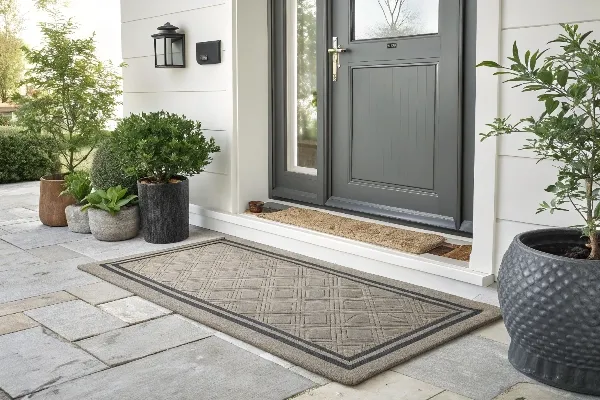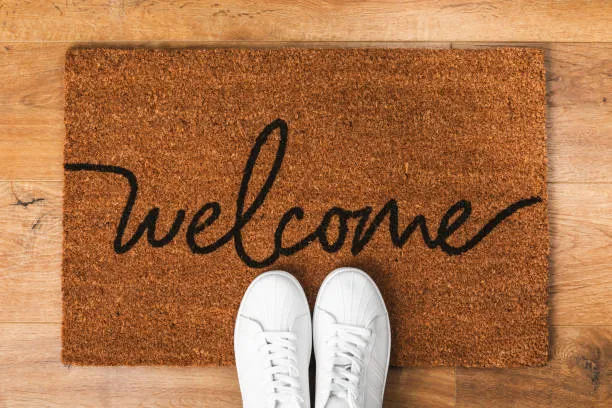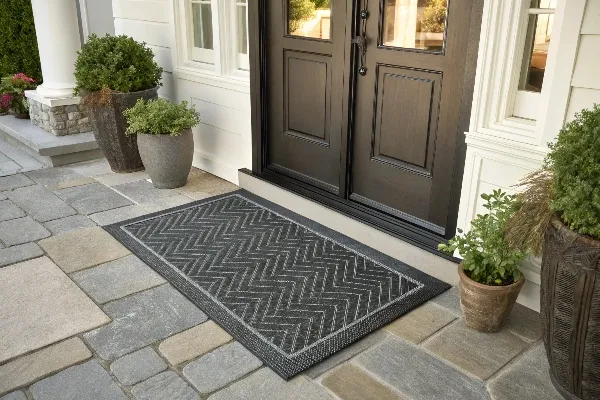Too many office buildings face slip and fall hazards when dirt and moisture gather at the door. This creates messy floors, potential accidents, and negative first impressions for visitors. To solve these problems, installing a heavy-duty mat system offers a safe, anti-slip surface, instantly elevating your professional image.
How can an office building anti-slip entrance mat enhance floor protection?
By using a commercial entrance solution that trap dirt and moisture right at the threshold. This stops grime from tracking inside, reduces slip and fall accidents, and keeps the floor area cleaner. The entrance mat also safeguards your indoor floor surface to prevent wear and tear over time.
1. Why Does an Office Building Need an Anti-Slip Door Mat?
A mat is essential for both residential and commercial spaces, but office buildings face unique challenges due to heavy foot traffic. Visitors, employees, and clients track in dirt and moisture, making surfaces slippery. This not only increases slip and fall risks but also degrades the floor prematurely.
To address this, many facility managers install a floor mat specifically designed to scrape dirt off shoes and absorb liquids at the entrance floor. A robust door mat ensures the cleanliness of indoor areas, saving maintenance costs and extending the life of your floor. Additionally, a high-quality entry mat or commercial entry mat can withstand constant footfall without losing its protective qualities.
Mats are constructed today with advanced features: some have ridges to channel water away, while others incorporate recycled rubber in a heavy duty design. These mats are durable against everyday wear and help keep the mat in place to avoid shifting. When you integrate an anti-slip backing, you create a safer walkway for everyone—reducing slip and fall incidents and contributing to a better brand image.
2. How Do Commercial Entrance Mats Improve Safety and Cleanliness?
Commercial entrance mats play a major role in preventing slip and fall accidents. By placing a mat at every commercial building entrance, you capture the bulk of dirt and moisture before it spreads inside. This single step drastically reduces janitorial tasks and lowers the likelihood of accidents.
A safety mat must offer enough traction to secure sure-footing. Look for mat features like a rubber underside to hold the mat firmly, or a non-slip indoor outdoor surface so it grips well whether it’s deployed in an indoor entrance or near outdoor commercial doorways. With a suitable commercial door mats setup, you create a friction layer that helps block unnecessary movement.
The mats will help with cleanliness too. By catching grime at the threshold, the mats offer you tidier corridors, fewer wet footprints, and happier visitors. Even a welcome mats style with ornamental designs can do wonders for keeping floors clean. The best part is that these commercial entrance mats are generally easy to clean, meaning staff can quickly shake them out or hose them down with minimal effort.
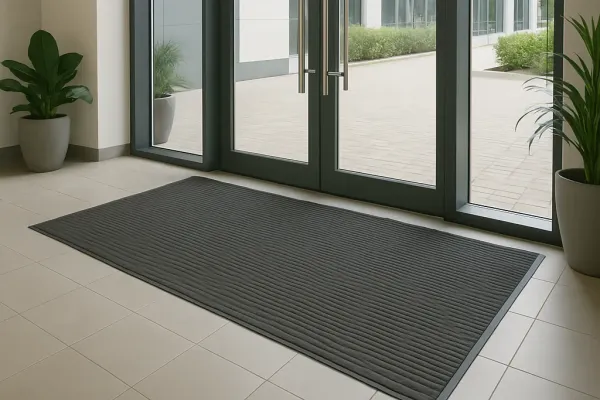
3. Which Door Mat Options Are Ideal for Use in Commercial Buildings?
Office structures often need multiple mat types, tailored to different areas. For instance, a rubber mat might work outside the front entrance for outdoor use, while carpet mats or waterhog mats might fit nicely in the lobby. This blend of mats is crucial if you want to effectively trap dirt and moisture in high-traffic zones.
- Rubber Floor Versions
- Great for outdoor mat applications
- Provide anti-slip traction
- Often use recycled rubber to be eco-friendly
- Carpet Entrance Solutions
- Offer plush, welcoming appeal
- Effective for absorbing dirt and moisture
- Perfect as an indoor mat for lobbies
- Aluminum Entrance Mats
- Common in upscale commercial buildings
- Ideal for use in high-end lobbies or malls
- Often feature a recessed floor mat design
“In our office, combining a heavy-duty rubber option outside and a plush indoor commercial door solution inside proved to be the key to spotless floors,” says an office manager from Boston.
Here’s a quick table outlining several mat varieties commonly found in commercial settings:
| Mat Type | Best Location | Key Benefit |
|---|---|---|
| Rubber Entrance Mats | Outdoor use | Scrape dirt effectively |
| Carpet Entrance Mats | Indoor entrance | Mats absorb water & debris |
| Aluminum Entrance Mats | Hotel, High-end Lobbies | Sleek finish, heavy duty |
| Drainage Mats | Industrial Kitchens | Quick water flow-through |
For a dependable solution, you might explore heavy-duty double stripe welcome door mats if you manage a retail chain or pvc printed door mats if your building sees a constant stream of visitors.
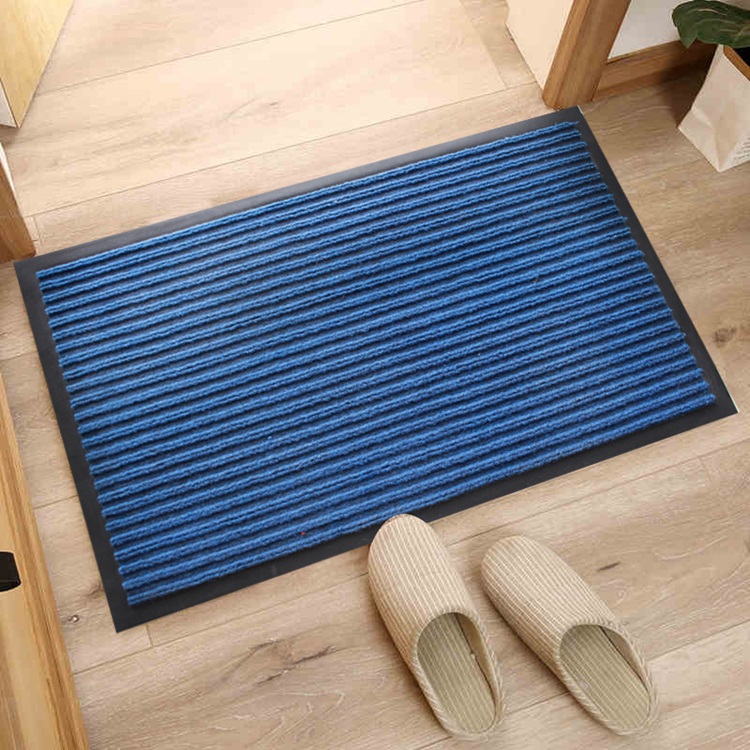
4. Why Is Mat Size Important for Commercial and Industrial Areas?
Mat size determines how much floor space is covered. If you run a larger commercial operation, you need a bigger mat at the main entrance to handle steady foot traffic. When the mat is designed too small, people bypass it, dragging grime deeper inside. Conversely, a long and wide enough floor mat ensures each step lands on the mat—helping to remove debris or moisture effectively.
Mats are made with different dimensions and thicknesses. Generally, a recommended length is about 8-15 feet to let shoes take multiple steps on the mat. This repetitive contact dislodges more dirt. For industrial settings with heavy machinery or specialized footgear, an extended commercial floor mats coverage is even more essential.
Remember, a well-sized mat not only looks professional but also helps with slip reduction. If the edges are flush with the floor and the backing is slip-resistant, your entire entrance area stays streamlined. Additionally, a bigger coverage can reduce wear on adjacent floors and cut down on maintenance costs.
Looking for something plush yet stable? Check out area rug if your entrance hall demands a cozy vibe, or for something more minimalistic, try non slip PVC loop coil plain indoor mat.
5. What Are Interlocking Floor Mats and How Do They Help?
Interlocking floor mats are puzzle-like panels that fit together to cover large areas. These are popular in commercial and industrial spaces needing flexible, modular solutions. If an area experiences heavy traffic, you can add or remove panels for quick replacements without pulling up the entire floor.
Such mats are especially beneficial in transition zones, hallways, or places that demand a non-slip indoor outdoor surface. Mats used in this capacity often feature drainage holes or ridges to keep surfaces drier. This design makes it easy to handle liquids and keep the walkway safer.
Moreover, interlocking mat panels are frequently made from recycled rubber or other resilient materials. They can handle tough conditions, maintain traction, and preserve floor protection for years. If you aim to reduce slip and fall incidents in wide or oddly shaped areas, these can be an efficient, cost-friendly solution.
6. How Does an Indoor and Outdoor Use Mat Benefit Commercial Doors?
Some buildings incorporate an indoor and outdoor system to maximize coverage. Placing a door mat outside the entrance begins the process of scraping off debris, while an indoor mat inside absorbs residual moisture. This layered approach significantly lowers the chances of moisture at the door leading to slip and fall accidents.
- Outdoor Mat Advantage
- Mats are also built to handle weather extremes
- First line of defense in capturing mud, snow, or sand
- Minimizes the mess carried inside
- Indoor Entrance Enhancement
- Soaks up water from shoes
- Provides a warmer, more inviting look
- Mats will provide a safer walking path
A carefully chosen dual mat system ensures that your floor experiences less wear. This synergy helps maintain a polished look in lobbies or corridors and fosters a professional environment. For offices wanting an extra brand flourish, a logo mat or custom logo mats inside can greet visitors with brand imagery, while a heavy-duty mat outside handles grit.
Curious about heavier coil designs? Explore factory wholesale pvc coil hello door mats if you prefer a robust coil to scrape dirt outside, then pair it with something plush indoors.
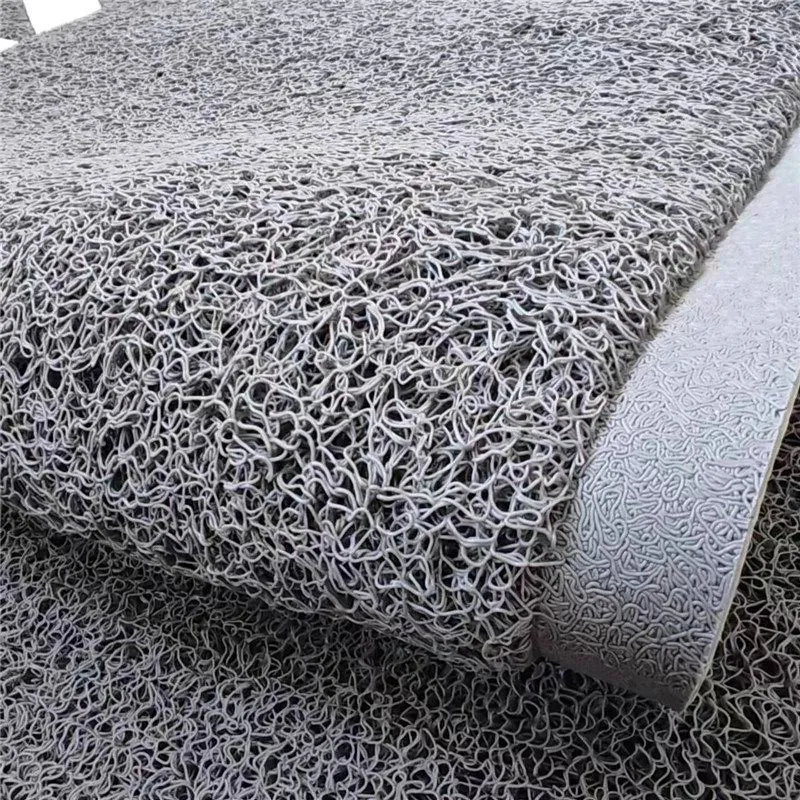
7. Are Custom Logo Mats Worth the Investment for Commercial Buildings?
Absolutely. A custom logo on a mat not only keeps floors tidy but also serves as subtle brand promotion. Many offices place their logo mat or custom logo mats at the commercial building entrance, so every visitor instantly sees their branding. This approach cements company recognition and fosters a cohesive, professional feel.
Mats are designed with safety and branding in mind. Durable threads or rubber elements combine to maintain the clarity of your logo. Beyond style, these commercial mats help unify a brand message across multiple locations—ideal for those with chains or franchises. Mats will help keep consistent branding, plus keep each site safer and cleaner.
When you use in commercial properties, you also project an organized, well-thought-out persona. Clients or partners notice these touches, resulting in deeper trust in your business. If you want to add a personal flair, consider nylon printed door mats. They provide crisp, vibrant prints suitable for in-house logos and brand statements.
8. Do Recessed Floor Mats or Drainage Mats Work Better for Larger Commercial Spaces?
When dealing with larger commercial lobbies or entrances, you might choose recessed floor mat systems or specialized drainage mats:
- Recessed Mats
- Fit into a lowered well or cavity in the floor
- Creates a flush surface, preventing tripping hazards
- Ideal for places wanting a seamless look
- Drainage Mats
- Feature holes or slots for water to flow through
- Perfect for high-moisture areas, like pool entries or industrial zones
- Mats combine dryness with slip-resistance
Which suits you depends on your building’s design. If aesthetics rank high, a recessed mats arrangement can blend with your overall motif. But if you handle frequent spills or water intrusion, drainage mats might be your best bet. Both types can be found in various mat sizes and constructions, ensuring you meet your exact safety and style needs.
If you’re leaning toward sleek insets, commercial anti slip outdoor herringbone front door mats are an example of robust coverage with style. Or if you need advanced drainage, draining pvc shower mats might be a blueprint for how water flows away efficiently.
9. How Do Commercial Floor Mats Enhance Long-Term Floor Protection?
Commercial floor mats protect from daily scuffing and keep cleaning expenses in check. They’re designed to withstand heavy foot volumes while preserving the underlying floor finish. In many commercial settings, foot traffic can be relentless, especially during peak hours or events. A sturdy mat in your main corridor or commercial building entrance spares your tiles or carpets from continuous pounding.
Mats absorb moisture, oils, and other residues that would otherwise seep into the floor surface. Some designs even incorporate specialized fibers to trap the smallest particles. By adopting these advanced mats, you’re essentially giving your floors a protective shield. Over months or years, that translates into fewer repairs, less refinishing, and a consistently polished atmosphere.
Maintaining them is also straightforward: many mats are easy to clean. Vacuuming or quick washing usually suffices, so your staff can keep the premises tidy with minimal disruption. Considering how mats provide functional and aesthetic benefits, it’s no wonder many facility managers see them as a must-have for floor protection.
10. Why Is a Commercial Entrance Mat an Essential Safety Mat?
A commercial entrance solution acts as a safety mat to reduce falls and gather debris. The mat is perfect for any place that sees a significant number of footsteps daily. By employing a commercial door or entry mat at the threshold, you block out hazards that typically lead to accidents, such as wet floors or loose dirt.
Additionally, commercial welcome mats can be customized to fit your décor and branding while fulfilling a safety role. Some mats incorporate beveled edges, ensuring a smooth transition from the floor onto the mat, mitigating trip points. Others are lined with adhesives or grippers to hold the mat in place, especially in high traffic conditions.
A prime example is the use of rubber floor solutions in commercial buildings. The rubber base adds friction to the underside, boosting stability. Some facility managers also use recycled rubber or post-consumer materials, balancing eco-consciousness with slip-resistance. Ultimately, the presence of a commercial entrance or commercial door mats setup fosters a safer environment for employees, clients, and visitors.
FAQs
How often should I clean my commercial entrance mat?
It depends on foot traffic. For very busy offices, a daily vacuum might suffice. If the mat sees moderate use, weekly shaking or spot cleaning can keep it fresh. Remember, mats are easy to clean and can significantly reduce cleaning for the rest of your facility.
Are there different mat types for indoor flooring vs. outdoor use?
Yes. An indoor mat often focuses on liquid absorption, while an outdoor mat emphasizes scraping debris. Combining both ensures you capture grime at each stage. Many offices also incorporate transitional mats for indoor and outdoor use if the building design allows it.
Do I need a heavy-duty mat for every entrance?
If you have multiple commercial building entrance points with consistent foot traffic, it’s smart to place a heavy-duty mat at each. That way, you withstand heavy foot traffic across all major entry points, preserving cleanliness throughout the property.
What about custom sizing for unique entrances?
Absolutely. You can order a mat that fits your unique layout, from small side doors to grand lobbies. Mats will help keep your floor looking pristine no matter the shape or size.
How do logo mats compare in durability to standard mats?
A well-made logo mat or custom logo mats typically uses top-tier materials that match or exceed standard mats in longevity. The difference is the branding on top, which remains crisp thanks to colorfast fibers or specialized printing.
Bullet Point Summary
- Installing an entrance mat or commercial entrance mats helps trap dirt and moisture at the door.
- A floor mat or indoor mat reduces slip and fall risks and maintenance costs.
- Mat size and material choice are key for heavy traffic coverage.
- Interlocking floor and recessed floor mat systems address large, high-moisture areas.
- Logo mat or custom logo options enhance branding while providing floor protection.
- Mats are also beneficial if they use recycled rubber for eco-friendly solutions.
- For maximum efficiency, try a combination of indoor and outdoor or multi-zone mat setups.
- Keep your mat clean to prolong its lifespan and maintain your facility’s image.
- A well-chosen mat saves money, reduces hazards, and creates a positive impression.
If you want to learn more about selecting the ideal commercial floor mats for your office building—whether it’s a rubber mat, carpet entrance solution, or aluminum entrance mats—we’re here to help. We offer a wide variety of commercial entrance choices to suit your style, budget, and safety goals.

